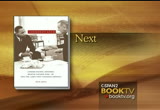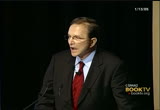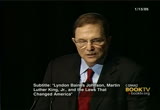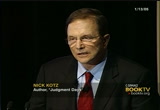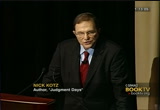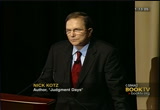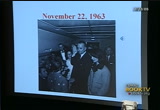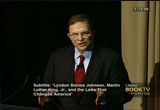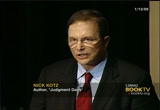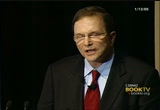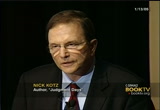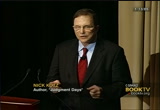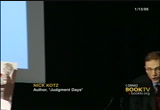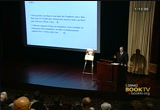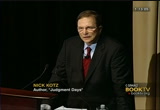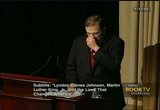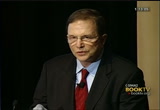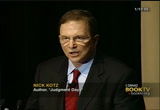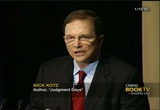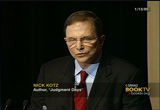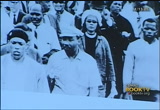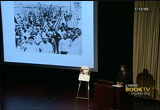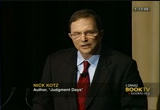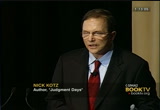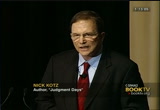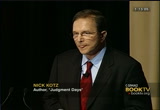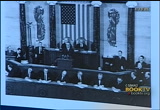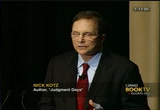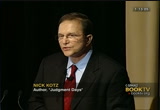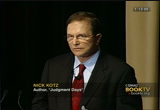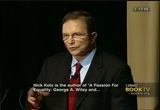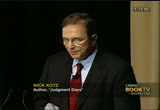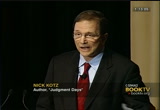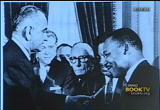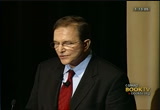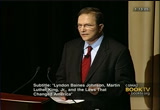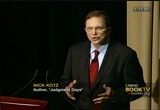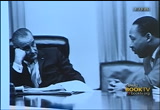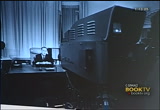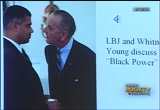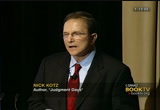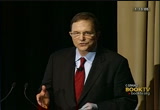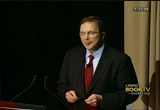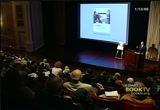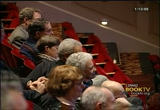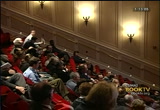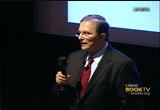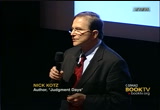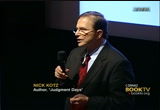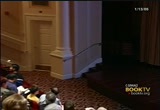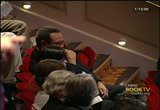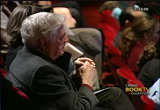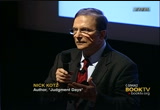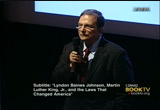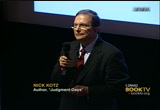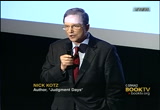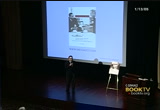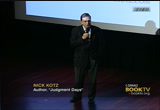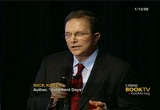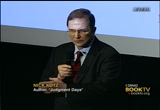tv Book TV CSPAN January 21, 2013 1:00pm-2:00pm EST
1:00 pm
book tv continues with mr. kotz on martin luther king, jr.. this is about an hour. [applause] good evening. it's a pleasure to be with you all. just two days shy of martin luther king's birthday, to talk about some things that took place in the 1960's that literally changed the history of this country. i am hoping to call on you all to participate in this talk
1:01 pm
about not only why those things happen in the 60's, but to talk about where do we go from here in a society that has despite great accomplishment has not fulfilled the passion and the dreams of lyndon johnson and martin luther king in a more just society. but i must tell you what we are sitting in today and the interactive exhibits are out of the hallways and the public walls of the national archives are a totally new phenomenon. ..
1:02 pm
1:03 pm
value this place deeply. it's very, very important. your participation is urged because it's a good thing and for an additional reason, that my vocal chords may fail sometimes but i'm going to go for it, and let's hope i can keep on talking. the two days -- no. i want to add one more thing about the archives. john said it, and it's true. people like me, who want to research american history, are incredibly dependent on the resources of the national archives. i, and my research assistants,
1:04 pm
including josh israel, who is up there someplace and is going to give us some entertainment with johnson and king talking. could not possibly have gotten as far as we got in trying to unravel the story without the resources of the archives and the unfailingly courteous, bright, helpful people from the archives. and i want to personally thank them, not only in behalf of myself but in behalf of other people who work in this field. they're just great. the idea of this book was sort of a gamble. it was a hunch. i wondered -- there have been lots of books written about king. lots of books written about
1:05 pm
johnson. there's been lots of books written about civil rights. but no one had taken johnson and king together, put them under a microscope, and watched what they did day-by-day through an incredible period of history. a two-year period, from kennedy's assassination, to the passage of the voting rights act, when numerous of our most distinguished historians say, more legislation of huge impact on our society took place in that brief period than any other period in american history. you can stack it up along roosevelt's first 100 days.
1:06 pm
teddy roosevelt's good times welcomes andrew jackson. none of them excel what got accomplished in that brief period of time, and i think there's a joy and pleasure in reading about it, but i think we still have things to learn. so, anyway, i thought if i took king and johnson together and used them, their relationship, their agreements, their disagreements, i would have slightly new prism to be able to look at why all this stuff happened in that period of time. there were many, many, many factors. when i talk with people, some will say, well, it was because
1:07 pm
jfk got and i would the country felt remorse and guilt. that was an element. it was because momentous grassroots civil rights movement was coming to a zenith of its power, and that civil rights movement, thousands of black men and women and a lot of supportive white citizens, was building toward a crescendo of pressure which dr. king could not resist, and lyndon johnson couldn't. they were constantly being pushed from below by people who wanted action.
1:08 pm
johnson becomes president on november 22, 1963. he is an accidental president. he had been in the backwaters of the vice-presidency. heed been drinking too much. he was fat. he was unhappy. he was cantankerous, and he was a forgotten man. martin luther king, on that day, faced a crisis of his own. the civil rights legislation that john f. kennedy finally introduced in june of '63, pushed by the demonstrations in birmingham, which revealed the police dogs dogs and the fire h. suddenly the government had to act.
1:09 pm
the first great accomplishment of lynn johnson son, that not much attention is given to, is the magnificent way he assumed the presidency. this was a nation in crisis. we had a cold war going on. in which the -- there was huge fear of russian missiles heading our way. our president had been killed. we didn't know whether it was the russians who had kill him or castro or -- it was great, great uncertainty. and johnson came to that job, reassured the nation, took the reins of government, and during that first year, he was president, passed the historic 1964 civil rights act, which
1:10 pm
outlawed official segregation in the south, made employment discrimination a crime. it was a very, very -- probably the most important advance since lincoln signed the emancipation proclaimation, and during that year, if johnson was mr. inside, and some outside, because he gave some inspirational speeches -- king kept the pressure on. whenever he thought that the congress was going to falter, that they couldn't beat a southern filibuster, king went to jail, and he refused to let people forget what this was all about. i'd like to concentrate on one
1:11 pm
particular period, because we have an anniversary coming up today, and i think looking at johnson and king during the struggle over the voting rights act in 1965, illustrates as well as anything the brilliance of both these men, the difficulty of their task, and their multidimensional leadership. the most important aspect of -- one of the most important aspects of which was the uncanny ability of both johnson and king to seize opportunity. they knew when to strike. on january 15, 1965, president
1:12 pm
johnson called martin luther king to congratulate him on his 36th birthday. listen to a little bit of what they had to say. [inaudible] well, we'll move along, and when we're ready for that, but the gist of the conversation, and the conversation comes from lyndon johnson's tape-recorded telephone calls -- is really wonderful. king has just arrived in selma to begin a campaign for voting rights.
1:13 pm
blacks in the south were -- in at the deep south, were prevented from registering to vote and from voting by many, many different means. in this conversation, we have the rare picture of king advising johnson how he is going to get re-elected in 1968 by getting the southern blacks registered. and johnson is advising king -- johnson, who detests demonstrating in the streets, as most elected officials did -- is giving king clues about how he can make those demonstrations more effective.
1:14 pm
here go. sound, lights, camera. someone let me know whether we have it or we don't because i'm going to keep on talking. [inaudible] >> pardon? at any rate, a close working relationship became even closer as civil rights movements and people in congress tried to put an end, finally for all time, they hoped, black citizens being denied the right to vote. the first crisis came at the edmonton's bridge in selma,
1:15 pm
alabama. king's lieutenant started off on a march from the town of selma, across the bridge, with the stated intent of marching to montgomery. none of them had toothpaste or backpacks -- a few of them had backpacks. it was a challenge. the idea was to produce a confrontation. excuse me. and it did. i'm sure all of us have seen the pictures of the sheriff's deputies, the straight troopers, trampling the demonstrators. the crisis became what to do next. and the way johnson and king handled that was really awesome.
1:16 pm
king was under intense pressure to march again two days later. thousands of supporters, ministers from all over the united states, had come to march with him. the leaders of snic were pushing him to march and accusing him -- some of them -- of being a coward if he didn't march. johnson was under enormous pressure to send federal troops en masse to alabama. both of them had a dilemma. king's dilemma, he never violated a federal court order, though he violated hundreds of ordinances and state laws. most of which were unconstitutional. and he didn't know what to do.
1:17 pm
johnson dearly did not want to send troops, united states army troops, into alabama. his fear was that this would precipitate really a second period of reconstruction. just as the marchers were getting ready to head out in defiance of a court or order, wh hundreds of deputies and troopers waiting for them. fruition came to a very subtle problematic plan that johnson had been working on all night, and king had been listening to all night. johnson said, former -- johnson sent former governor, rely
1:18 pm
collins, who had taken the job to run the federal con sillation service, on a plane at 2:00 in the morning. he was picked up by assistant attorney general john dore, and was driven to the place where king was staying. king came out of the bedroom wearing a robe and two officials gave him a plan. and lyndon johnson had participated in thinking it up. they said, reverend king, we not only have been talking to you, we've been talking to governor wallace, and he doesn't want anymore bloodshed, and what would would appreciate it if you would do would be to take your troops, walk on to the bridge, and when the troopers say stop,
1:19 pm
kneel, pray, sing, and then you turn around and lead them back. and we have assurances from the governor, george wallace, the segregationist governor of alabama, that his people will be restrained. king said to the federal officials, i have no idea whether i can pull that off. i'm under tremendous pressure to do this march and to carry it to its ultimate ending. but he said, i'll try. and collins then raced back to where the troopers were, all the while president johnson, attorney general katzenback are on live phones in the white house getting moment-by-moment
1:20 pm
reports of what is going on. collins rushes back to the troopers, and as he promised king, he stands in the line -- in front of the line of troopers with his arms up, saying, any troopers who attack these people will come through me. well, it worked. and johnson took a lot of heat. king took a lot of heat. both of them were constantly being besieged by their constituencies not only on the right but on the left as well. because of that success, one crisis was averted. then came a second one. only a few days later.
1:21 pm
what was johnson going to do if the officials of alabama refuse to uphold the law when this march was authorized by judge frank johnson, a very brave tennessean, a republican, were they going to allow these people to be picked off by snipers, to be attacked? and wallace was not going to lift a finger to do a thing. then came a remarkable meeting. johnson sort of mouse-trapped wallace into coming to the white house on saturday, march 13th, and for two hours and 45 minutes, 6'4" president -- the
1:22 pm
6'4" president from texas -- he had placed wallace, who was about 5'6", in a deep cushioned couch, and johnson sat in his chair, doing to wallace what senator humphrey once called the nostril examination. this was the johnson treatment at its most sophisticated and the johnson treatment, i don't think, is totally understood. it wasn't just threatening, brow-beating, trading political favors, although that is part of politics, and there was some of that. johnson was, like king, always
1:23 pm
trying to appeal to the better natures of our souls. that's a line from abraham lincoln in the second inaugural address. and so we started talking to wallace, why don't you integrate the schools? why don't you do this? you started out at a populist, george. you were a man of the people, and now you are doing this. and finally, he reached the point that he wanted to get to, and he said, george, don't think about the 1968 election, for which wallace wanted to compete. think about 1988. we'll both be dead then, and what's it going to say on our graves? do you want to have a granite
1:24 pm
tombstone that says, george wallace, he built, or do you want to have a pine stick in the red soil that says, george wallace, he hated. johnson didn't convert wallace, but as wallace walked out to talk to the reporters, he was a very subdued governor wallace. and he said to the reporters, well, if i'd stayed in there another five minutes he would have me coming out in favor of civil rights. johnson had accomplished his purpose, and he knew it. because when the crucial time came, wallace asked -- wallace said he didn't have the resources to protect the
1:25 pm
marchers, and he virtually invited president johnson to nationalize the alabama national guard. two days after that meeting, came a great moment. johnson went before joint sessions of congress to ask for the voting rights legislation, and to ask for it in a speech which numerous historians rank as one of the three or four greatest speeches given by an american president. do we have some sound up there? no. you all will remember -- anyone
1:26 pm
as old as me or half as old as me will remember what a couple of the punchlines were in that speech. johnson said, we've got a lot to do. we've got a lot of history to overcome. we have a lot of cultural differences and problems to overcome, and he went on and on, overcome, and finally he said, staring ahead at that audience, and we shall overcome. that was an incredibly important statement because the president of the united states had just adopted the song of the civil rights movement. there were many, many other things in that speech that were
1:27 pm
important, but the most important one was what he said right after that. he said, the hero of this struggle is the american negro, and he went on to describe the marching, the beatings, the murders, they went through. the american negro is the hero. and that kind of -- martin luther king was not at the speech. he was asked to sit in the presidential box. he wasn't there because he had to attend a funeral that day, a memorial service, for a reverend reib, a unitarian minister from
1:28 pm
boston, who had come down and had been killed after having participated in a march. king was sitting in the home of his host, and young john lewis from the -- from smic, the chairman of the student nonviolent coordinating committee, told me, that's the only time i've ever seen martin cry. the tears were pouring down his face. lewis would tell you, andrew young, king's top lieutenant would tell you, that he was a totally rational person as he went about the business of leading his part of this movement. he was not seeking martyrdom.
1:29 pm
he was deathly afraid everytime he went out into an exposed situation. he refused sometimes, saying, when the young snic guys were pushing him to do something particularly dangerous, i think i ought to have the right to choose my own golgatha, one name for the hill where jesus was crucified. there was one more minor crisis before that 1965 voting rights act got passed. the senate liberals led by ted and robert kennedy, were trying to attach to the bill a constitutional amendmentle outlawing the poll tax. this was something that needed to be done, obviously.
1:30 pm
the attorney general katzenback feared the courts were going to say it's unconstitutional. you have to do it by an amendment. you can't do it this way. and so there was going to be a critical vote in which it was possible that the democratic liberals and the republican liberals were going to attach this thing on. what bothered the administration was they barely had the votes, 67 votes, to defeat a southern filibuster. and if they couldn't break the southern filibuster, there would be no legislation. so, johnson called up dr. king -- i urge all of you to get some of these tapes and listen to them. the conversations between king
1:31 pm
and johnson are absolutely priceless. and johnson said, dr. king, -- because king wanted to support this plan. he says, well, dr. king you have to make up your own mind of -- about who you want to trust, who you want to think is representing your cause, and if you believe you want to support this amendment and you trust the kennedys, god bless you. go do it. but on the other hand, if you really want to get this bill passed, i need you to back off. and they defeated the amendment. those were tiny, tiny examples of a pattern of two men who were
1:32 pm
not friends, who appeared not to be natural allies, who had many complaints about each other, and yet they managed to work together. at this point, in my opinion, king and johnson in their own context, were both men of the center. both of them, johnson used to say, let us come reason together. king did that every single day of his life. it was wonderful when -- back to selma -- whether to march -- whether or not to march, whether to violate he court order. there's a great lawyer from
1:33 pm
birmingham by the name of c.l.ic chestnut, and he was busy getting people oust jail for two years. chestnut sat in on those always contentious meeting, and he described what king did out those meet examination how he did it. king did a lot of listening. james farmer, other great leaders, very bright leaders, thought king was sort of inept and lost in these meetings. because he wasn't arguing a point of view. chestnut said that king would listen until everybody had had their say. if it took hours, he would listen. and then he would sum up the different points that had been
1:34 pm
made, the different approaches, pros and cons, and he'd say, well, i think maybe we ought to do so and so. this is chestnut said. after sitting in these meetings in selma i decided martin luther king was one hell of a field general. no one else, chestnut said, could have unified that collection of ministers, gangsters, self-seekers, prima donnas, and devoted high-minded people we had in selma that winter. that really kind of gets at a quality of king that we don't often hear about. we hear about the inspiring ardor, we hear about this courage, but he was very skilled
1:35 pm
field general, knowing when to attack, when to pull back, when to compromise. he was masterful, and watching johnson and king on a chess board, both doing this, is an amazing sight. i just want to say one more thing, and that is about how their relationship ended. and open this up to you. johnson -- lyndon johnson was a very insecure man. no matter how great his triumphs, he was insecure. lyndon johnson resented the fact that he didn't get just awesome praise every day from the civil rights leaders for what he had
1:36 pm
accomplished. he resented it. lyndon johnson didn't like the fact that king was carrying on demonstrations at very inconvenient times for the administration. he envied king. he envied the love that king got from the public. just as he envied the martyred john f. kennedy and later his martyred brother, robert kennedy. and yet johnson managed to get past all of his hangups, to get the job done together with king, and then tragedy struck big-time. five days after the voting rights act was signed by the president, with king at his
1:37 pm
side, the largest riot in american history broke out in the watts section of los angeles, california. both johnson and king were surprised. and were slow to respond initially. johnson just -- people tried to call, telling him we needed to send airplanes out to help the california guard transport troops. he wouldn't take the telephone call. he was just so totally demoralized. and so was king who was on vacation in puerto rico. but they snapped out of it. but the riot was a symbol of the fact that revolution was now heading in another direction.
1:38 pm
young, black, impatient, dissatisfied with the amount of progress that was being made, launched launched launched the back power movement, which both johnson and king resisted as best they could. there's a wonderful conversation, which we'll play for you another time in which johnson is talking to whitney young, the head of the national urban league, and johnson says, whitney, i just don't understand this black power thing. he said, i'm in favor of green power, red power, white power, i just want to get it done for everybody. and king, with great difficulty, tried to resist the -- not
1:39 pm
because he didn't think black people should have power, but because he feared that the message would be misinterpreted and it would inflame the backlash. since those days in the late '60s, i would contend that the counterrevolution of the conservative has held power more often than not. and that happens because not everyone was happy with what had been achieved. on march 31, '68, a really beaten, agonized, tired, lyndon johnson, brought the cameras into the white house and announced he would not seek another term.
1:40 pm
three days later, dr. king, equally tired, equally beaten down, trying to pull off -- trying to pull a rabbit out of a hat by getting a rag-tag band of people and taking them to washington to petition for their rights, made his last speech. all of us should listen to that speech. you're familiar with it. he said, i've been to the mountain top, i've seen the glory, and then he tells the people, i may not get there with you, but you will succeed. the next day, king was assassinated. we had huge riots. johnson's response, one of his responses, was the same as when
1:41 pm
john f. kennedy was assassinated. it was another piece of civil rights legislation that was having trouble getting out of the house rules committee. it was a miracle that in the year 1968, a much more conservative congress was considering it, and one of the first things johnson did was to gather his staff and say, we're going to pass the 1968 fair housing act. and they did. that was his tribute to martin luther king. it's a great story. i've enjoyed working on it enormously. i have to leave you with one impression as i've done all this research. when you read what king and
1:42 pm
johnson and these other folks were doing, there were giants. these men and women were giants. you read their words and you wonder, where have the giants gone? i invite you to make comment -- [applause] >> and this audience is filled with people who were the actors in this history. in the second, third row there, is a gentleman by the name of lee white. lee white was the counsel to the president under both president kennedy and president johnson. and civil rights was his field,
1:43 pm
and he has been enormously generous in letting me bother him about every week about something, and sitting to his left is roger wilkins, an assistant attorney general who, during the period of the worst conflict, went into chicago and oakland and so forth to try to bring peace and progress. peter, can you -- further down is peter edelman, a legislative assistant to senator robert kennedy. he was involved. lawrence, are you here? lawrence, a great civil rights
1:44 pm
leader, was the chairman of the mississippi freedom democratic party,, at a critical moment, ad he has never stopped keeping on, keeping on. let's talk about the past or let's talk about what do we do next? >> let's go to questions. we have a microphone. yes, sir? >> seems in retrospect the kind of eulogy for american liberalism, like an age that may never return, like looking at a -- the last shining of the sun before a period of decades of darkness. don't mean to be mellow dramatic here. you have not mentioned the word vietnam, and i'm always wondering, could american history have taken a different
1:45 pm
path that we wouldn't have come to the place we are today? >> why did you abandon my script and wing it? how could i forget about vietnam. my piece -- my thought on vietnam -- [inaudible conversations] s -- my thought on vietnam is that lyndon johnson, so to speak, was trapped from day one. when johnson became president, we were losing, change of government every couple of weeks. johnson, as you -- we were going to play a telephone conversation between johnson and richard rusk, the head of the armed services committee. johnson couldn't see any way out, and he did what he often
1:46 pm
did successfully, by seeking the middle ground and, as senator frank church said, this was one problem that could not be solved that way. namely, if he resisted the generals about bombing hanoi into the stone age, and if he resist the kids in the streets and didn't, as he said, tuck tail and go home, that that he would be in some sort of middle position, maybe politically but could never solve the problem. i also didn't say that, after april 4th, 1967, when martin luther king made a -- his most powerful speech against this war, he cut the tie with lyndon
1:47 pm
johnson, the two men became enemies and they tried to destroy each other politically. king said in that speech that, we, the united states of america, are the worst purveyors of terrorism in the world. and that line and others didn't just offend johnson. king was blasted by all the leading newspapers and by his fellow african-american civil rights leaders. but the stuck to it. the day after that speech, johnson called in george christian, his press secretary, now deceased, and he said, george, i want you to go over to j. edgar hoover, get all those
1:48 pm
files showing what commie king is and his immoral life, and i want you to take them to carl roun, a black newspaper columnist, a former member of the administration, and five days later, the onslaught started with a rowan column, and they were in a war from then on. >> question here. yes, sir. get a microphone over there. >> i want to congratulate you on the book. when i look at how you have covered the passage of the '65 vote rights act, and you talk about the -- you identify congressmen mccollum of ohio who was involved in the '64 act, the '65 act, and was the key man
1:49 pm
who, when we brought the congressional challenge, was able to face both sides. we have chase, we can strike the voting rights act or we can unseat the congressional delegation, and it was he took the mother applied on mid mist d. mississippi and turned it into section 5 of the voting rights act, without that a lot of people wouldn't have been elected. i think you have done a tremendous piece of work and i'm very proud how you handled the mississippi democratic party. i could not have done a better job. [applause] >> who has some opinions contrary or whatever to our conversation? >> repeat the question. >> this is one of the great
1:50 pm
journalists who covered the movement when he was a reporter on the nashville paper, later with "the new york times," the editor of the "atlanta constitution." bill kovich. >> as a very careful observer of the times, you live through it and you reported about it, how did your -- tell me who things, what was the biggest surprise you discovered, and how did you change your mind based on your research? >> what was the biggest surprise and how did i change my mind? i think the biggest surprise was that j. edgar hoover and his fbi's campaign to destroy king politically, at least, was far more vicious, was far more
1:51 pm
relentless, and cruel, and i could imagine that public officials in the united states would do. how did i come to that conclusion? after a two or three year battle with the fbi and with my friends in the lbj library, part of the national archives, i was finally able to put together a mosaic of hundreds of fbi memos that went to the president. i saw how the president reacted to them, and didn't react to them. and even though great reporters have covered this story well, starting in '75 with the church
1:52 pm
hearings, i was appalled about that, and i don't want to be total alarmist, but when i see what the fbi has been empowered to do again, in investigating citizens, i have great pause. >> time for a few more questions. [inaudible] >> i changed my mind on really the central idea of the book. when i started out, a lot of very well-meaning dedicated white house aides and johnson cabinet officials told me that
1:53 pm
the president despised martin luther king, and why was i doing a book about this? johnson didn't have anything to do with king. well, when you looked at it much, much more closely, i think you come up with an enhanced view of johnson the good president, and you come up with an enhanced view of king, with a lot of his qualities that haven't been celebrated. you ask tough questions. >> we have a question over here. >> during the first half of 1964, when robert kennedy was still attorney general, how did he enter act with president johnson and dr. king?
1:54 pm
>> that another amazing story. which i'm sort of in awe of. and the bottom line to that story is that they were both patriots. when johnson became president, bobby kennedy was in huge distress and once he came out of the distress, and decided he wanted to get back in the picture, he wanted to be johnson's vice presidential candidate, there's some weird telephone calls when they were both fighting against the klan in mississippi, trying to find the murders of three men, and an 80-year-old man was indicted this week for those murders. so, here they are, they're
1:55 pm
working on this, and bobby said to lbj, i understand you're getting out kinds of reports about me. i understand you know everything i'm up to. what i'm doing. and johnson said, oh, no. nothing could be further from the truth. but one of the jobs that johnson had the fbi doing was keeping track of bobby kennedy. now, against that, from november november 22nd, '63, through the passage of the civil rights law, the '64 civil rights law, there was amazing cooperation between these two men that -- who detested each other.
1:56 pm
amazing cooperation. it was bobby kennedy who first suggested that the fbi be sent in to mississippi to carry on the counterintelligence activities with which it had harassed the communist party. it was bobby kennedy who called the president and said, we need to protect king, when he was going on on a especially dangerous trip to mississippi. that was sort of an amusing conversation-but here you have the understated new englander, who -- mr. president, i really think we should have some fbi people with king when he makes this trip. it would be very inconvenient if he were to die and we would have another body to investigate. and he wasn't saying that in a mean sort of way. he was saying it with his dry
1:57 pm
wit. so they brought the plan together, the cooperated fully to pass the '64 civil rights law, and if i can put my hands on it, i'd like to read you a very short exchange between kennedy and johnson on july 4, 1964. the '64 civil rights act was signed and enacted into law by the president on july 2nd. on july 4th, lyndon johnson had gone down to the ranch. he had been out on his boat all day. getting his usual sunburn and baking off of alcohol.
1:58 pm
bobby kennedy had been in his office all day. tracking what was going to happen on our 4th of july, the second day that the law was in effect, forbidding discrimination, segregation, in restaurants, hotels, this monumental law, and bobby said, mr. president, you really had a good day today. and then he started ticking off things, the fact that the chamber of commerce in jackson, mississippi, had voted 16-1 to urge all businesses to be desegregate. johnson wasn't going to let that one go without a response. he said we had a good day, and in johnson city.
1:59 pm
115 Views
IN COLLECTIONS
CSPAN2 Television Archive
Television Archive  Television Archive News Search Service
Television Archive News Search Service 
Uploaded by TV Archive on

 Live Music Archive
Live Music Archive Librivox Free Audio
Librivox Free Audio Metropolitan Museum
Metropolitan Museum Cleveland Museum of Art
Cleveland Museum of Art Internet Arcade
Internet Arcade Console Living Room
Console Living Room Books to Borrow
Books to Borrow Open Library
Open Library TV News
TV News Understanding 9/11
Understanding 9/11